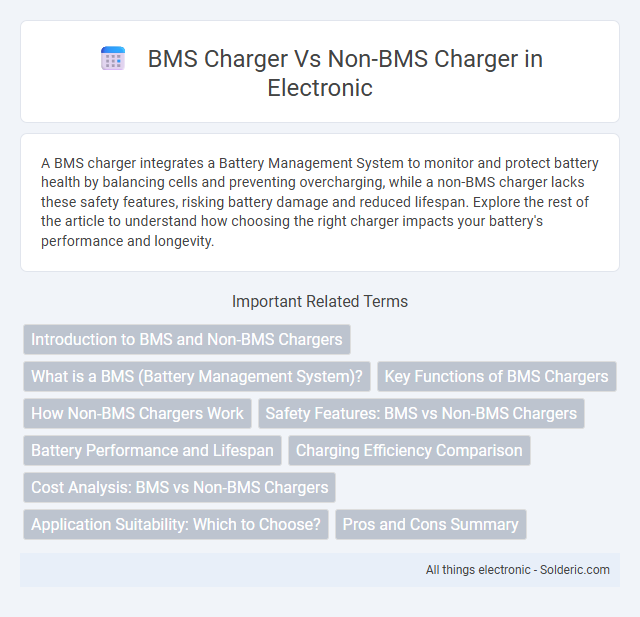A BMS charger integrates a Battery Management System to monitor and protect battery health by balancing cells and preventing overcharging, while a non-BMS charger lacks these safety features, risking battery damage and reduced lifespan. Explore the rest of the article to understand how choosing the right charger impacts your battery's performance and longevity.
Comparison Table
| Feature | BMS Charger | Non-BMS Charger |
|---|---|---|
| Battery Safety | Monitors and protects against overcharge, over-discharge, and short circuits | No built-in protection, higher risk of battery damage |
| Battery Life | Extends battery lifespan by balanced charging and protection | May reduce battery lifespan due to unmanaged charging |
| Charging Efficiency | Optimizes charging process for efficiency and battery health | Basic charging, less efficient and less precise |
| Cost | Higher initial cost due to integrated management system | Lower cost but with potential hidden costs from battery failure |
| Complexity | Includes advanced electronic management circuitry | Simple circuitry, easy to use but less smart |
| Applications | Used in lithium-ion, LiPo, and other smart battery packs | Typically used in basic or older battery technologies |
Introduction to BMS and Non-BMS Chargers
BMS chargers incorporate a Battery Management System that monitors and regulates voltage, current, and temperature to ensure safe and efficient charging, preventing overcharge, over-discharge, and short circuits. Non-BMS chargers lack these protective features, leading to potential battery damage and reduced lifespan due to unregulated charging conditions. Understanding the differences between your BMS and non-BMS charger is crucial for maintaining battery health and optimizing performance.
What is a BMS (Battery Management System)?
A Battery Management System (BMS) is a sophisticated electronic control unit designed to monitor and manage the performance, safety, and health of rechargeable batteries. It regulates charging and discharging processes, prevents overcharging, deep discharging, and ensures balanced cell voltage, prolonging battery lifespan and enhancing safety. Your device benefits from a BMS charger by optimizing battery efficiency and preventing potential hazards compared to a non-BMS charger.
Key Functions of BMS Chargers
BMS chargers integrate Battery Management System technology that continuously monitors cell voltage, temperature, and state of charge to prevent overcharging, overheating, and deep discharge. They balance individual battery cells to enhance battery lifespan and safety, ensuring optimal charging performance in lithium-ion battery packs. Non-BMS chargers lack these protective and balancing features, increasing the risk of battery damage and reduced efficiency.
How Non-BMS Chargers Work
Non-BMS chargers function by directly supplying a constant voltage or current to the battery pack without monitoring individual cell voltages or balancing charge levels. This approach can lead to uneven cell charging, reducing battery lifespan and increasing the risk of overcharging or overheating. Without battery management system (BMS) safeguards, non-BMS chargers lack protection mechanisms against voltage imbalances and thermal events.
Safety Features: BMS vs Non-BMS Chargers
BMS chargers incorporate advanced safety features such as overcharge protection, temperature monitoring, and cell balancing to prevent battery damage and thermal runaway. Non-BMS chargers lack these integrated safeguards, increasing the risk of overcharging, overheating, and cell imbalance, which can lead to reduced battery life or hazardous failures. The inclusion of a Battery Management System (BMS) is critical for maintaining battery health and ensuring secure charging operations.
Battery Performance and Lifespan
A BMS charger optimizes battery performance by continuously monitoring voltage, current, and temperature to prevent overcharging and overheating, which extends the battery's overall lifespan. Non-BMS chargers lack these protective features, often leading to uneven cell charging, increased risk of damage, and reduced battery capacity over time. As a result, batteries charged with BMS systems maintain higher efficiency and longer cycle life compared to those charged without BMS technology.
Charging Efficiency Comparison
BMS chargers optimize charging efficiency by continuously monitoring cell voltage, temperature, and state of charge to prevent overcharging and undercharging, resulting in longer battery life and improved energy utilization. Non-BMS chargers lack this intelligent regulation, often causing uneven cell balancing, increased heat generation, and reduced overall charging efficiency. Studies show BMS-equipped chargers can enhance charging efficiency by up to 15% compared to non-BMS systems, especially in lithium-ion battery applications.
Cost Analysis: BMS vs Non-BMS Chargers
BMS chargers typically incur higher upfront costs due to integrated battery management systems that ensure safety, longevity, and optimal performance, which reduces maintenance expenses over time. Non-BMS chargers have lower initial prices but may lead to increased risks of battery damage, reduced lifespan, and potential replacement costs. Evaluating total cost of ownership favors BMS chargers for long-term financial efficiency despite their higher initial investment.
Application Suitability: Which to Choose?
BMS chargers are ideal for applications requiring precise battery management, such as electric vehicles, solar energy storage, and portable electronics, where safety and battery longevity are critical. Non-BMS chargers suit simpler or cost-sensitive devices that do not demand advanced monitoring, like basic lead-acid batteries or non-rechargeable battery packs. Choosing a BMS charger ensures protection against overcharging, overheating, and deep discharge, making it the preferred choice for high-value lithium-ion or lithium-polymer batteries.
Pros and Cons Summary
A BMS charger offers precise battery management by monitoring voltage, current, and temperature, enhancing safety and extending battery lifespan compared to non-BMS chargers, which lack these protective features. While BMS chargers tend to be more expensive and complex, they prevent overcharging, overheating, and potential battery damage, unlike non-BMS chargers that risk reduced battery efficiency and shorter cycle life. Choosing between them depends on balancing cost against the critical need for battery health and reliability in specific applications.
BMS charger vs non-BMS charger Infographic

 solderic.com
solderic.com